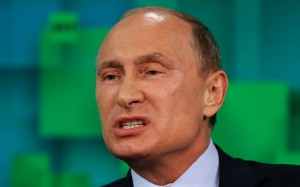by Stepan Kravchenko • Bloomberg
 President Vladimir Putin ordered defense chiefs to strengthen Russia’s strategic nuclear forces amid rising tensions with the U.S. over the global balance of power.
President Vladimir Putin ordered defense chiefs to strengthen Russia’s strategic nuclear forces amid rising tensions with the U.S. over the global balance of power.
New weapons should go to “all parts” of the nuclear triad of air, sea, and land forces, Putin told a Defense Ministry meeting in Moscow on Friday. Action must also be taken “to improve the effectiveness of missile-attack warning systems and aerospace defense.”
Russia’s military will have five new nuclear regiments equipped with modern missile complexes next year, Defense Minister Sergei Shoigu told the same meeting. More than 95 percent of the country’s nuclear forces are at a permanent state of readiness, he said.
Putin’s moves to reinforce Russian nuclear capabilities are reviving Cold War tensions with the U.S. and its allies in the North Atlantic Treaty Organization. The U.S. warned in June that the Kremlin’s “nuclear saber-rattling” is undermining stability in an attempt to intimidate European neighbors. Russia’s nuclear arsenal, its annexation of Crimea in 2014 and support for separatists in eastern Ukraine, in July led Marine General Joseph Dunford, chairman of the Joint Chiefs of Staff, to call the country the most pressing threat to U.S. national security.
Putin said Russia’s military must continue its program of training drills and devote special attention to the “transport of troops over long distances” as well as “strategic nuclear deterrence” and the ability to airlift forces including “anti-aircraft, missile and electronic elements.”
New Weapons
About 56 percent of Russian nuclear weapons are new, including modern missiles, upgraded aircraft and a strengthened submarine capacity, Shoigu said. Russia has also expanded the military’s combat capabilities by reinforcing its western and south-western army groups and building four bases in the Arctic region, he said.
NATO’s troop presence in the Baltic states and central Europe increased sharply in the past year, Shoigu said. The U.S. also has about 200 nuclear weapons sited in Belgium, Italy, the Netherlands, Germany and Turkey and has plans to modernize them, he said.
Amid a conflict with NATO member Turkey over the shooting down of a Russian warplane near the Syrian border last month, Putin ordered defense officials to “react harshly” to threats to Russia’s forces operating in Syria. Any such threats should face “immediate extermination,” he said.
The Russian air campaign in Syria against Islamic State and other militants is aimed at protecting Russia from terrorism, and actions are being synchronised with operations of special forces against domestic threats, Putin said. Airstrikes are being coordinated with both President Bashar al-Assad’s forces and those of the opposition Free Syrian Army, which has more than 5,000 troops fighting terrorists with weapons supplied by Russia, he said.
Islamic State has more than 60,000 terrorists and is expanding its influence in Syria and Iraq, Shoigu said. Russian airstrikes in Syria that began Sept. 30 have hit 8,000 terrorist infrastructure targets during 4,000 combat missions, he said.